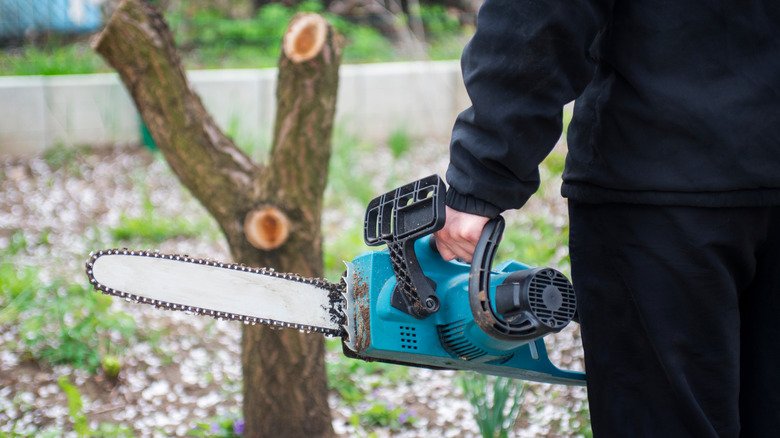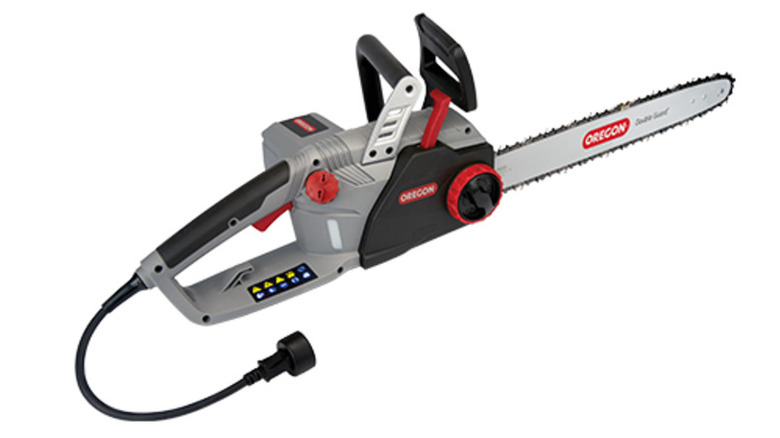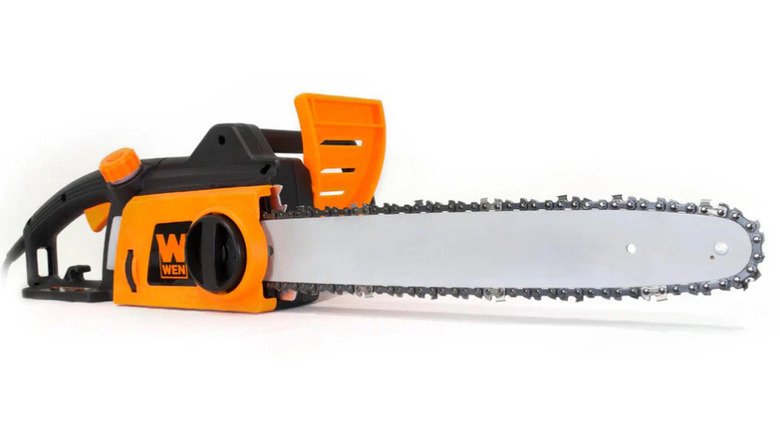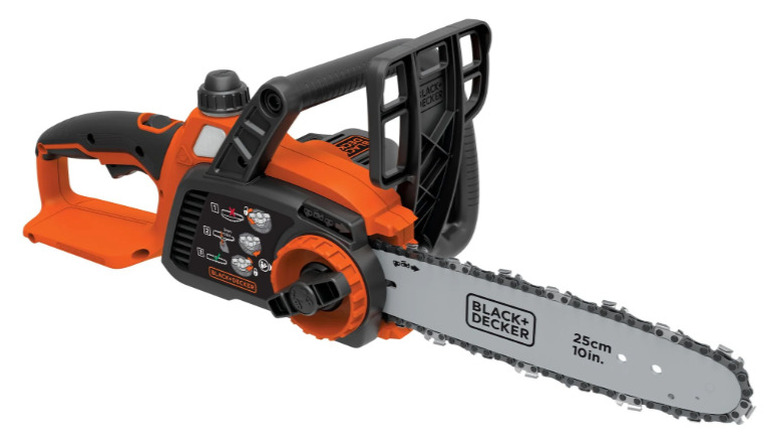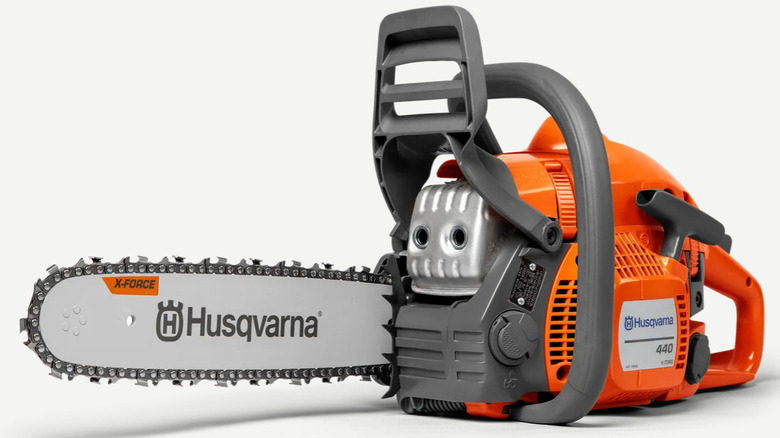The Best Chainsaws For Beginners That Won't Break The Bank
Chainsaws are super handy to have in your DIY toolbox, but some people are a bit put off by them. Admittedly, the traditional chainsaw is gas-powered and noisy. They will wake up your whole neighborhood, to say nothing of them spewing 2-cycle oil-rich exhaust as if it were a mosquito fogger. Additionally, it probably goes without saying that using a chainsaw can be dangerous if not done with care. However, in the last few years a newer breed of chainsaw has — for many people — replaced that internal combustion engine standby of old, especially when it comes to the market of first-time buyers: Electric chainsaws, both corded and cordless.
If you are a beginner, a corded electric chainsaw is likely your best bet. Not only do electric chainsaws have the benefit of always being ready (no gas to find or mix with 2-cycle oil), but they are lighter and easier to handle. And while there will always be a market for people who hate cords, the average homeowner will be best served by the corded variety, which is a pretty nifty choice aside from needing to be plugged into an electrical outlet at all times. Corded chainsaws are more powerful than their cordless cousins, and maintenance for these saws is minor, as it primarily involves making sure there is chainsaw oil in the tool (and a bit of cleanup after use).
That said, if you're a would-be chainsaw owner looking for your first purchase, we'll give you all the options. And while we're definitely going to recommend a corded electric number to get you started, we'll also give you some corded and gas models.
Let's start with the best-in-class beginner chainsaw
There are many acceptable options when it comes to corded electric chainsaws on the market. Some are, by comparison, very affordable. You can find them in the $60 price range, whereas it is much more common to see corded chainsaws priced at around $100. All of them are lightweight and have the advantages mentioned above, and all of them have the same limitation of being tethered to power cord (the longest effectively being around 100-feet). Most of them come in the neighborhood of a 15-Amp power range. Our selection has all of those features, plus three more that make it a winner.
The Oregon CS1500 Self-Sharpening corded electric chainsaw is outfitted with an 18-inch bar, the part of the saw that the cutting chain moves around. That's as long as you'll find on this type of saw. Moreover, you'll notice in its description that this model has a self-sharpening chain. This is an excellent feature. One common challenge for people just learning to use a chainsaw is to know when the chain is too dull to cut efficiently. That won't be a problem here.
And the third feature lifting this tool to top place is its Oregon bar. While not required regularly, it's not uncommon to need to replace a chainsaw's bar as they can become damaged with use. Oregon bars are easy to find and are of high quality. Historically, Oregon chainsaws have a reputation for quality and this feature-rich tool will run you only few dollars over $100.
Wen offers another excellent beginner chainsaw
While the Oregon CS1500 is a feature-rich chainsaw and a great value, it is still going to set you back a bit over a C-note. On the other end of the spectrum, both in cost and power, is the Wen 4017 16-inch electric chainsaw. Wen is a power tool manufacturer whose products have become more popular in recent years. Their wheelhouse is affordable, DIY-focused power tools. If your chainsaw tasks are limited to trimming and breaking down branches, and only cutting down small trees and shrubs, this tool is a great inexpensive option.
While some of the more inexpensive chainsaws feature shorter bars as small as 10-inches, Wen has outfitted this model with a substantial 16-inch bar. And it is an Oregon bar, just like the previous model, which means that it is high-quality and easily replaced should it be damaged in use. The machine is only 10 lbs. making it easy to work with, has a self-oiling chain and a "wrap around" hand guard for additional safety. All in all, it is a serviceable chainsaw that you can purchase for around $60.
Cutting the cord: A great electric chainsaw with no wires
Both of the tools recommended above are electric, but have to be powered by an extension cord. Some people find that too limiting. If you have a larger property, that is just a fact — even the 100-foot limit of an extension cord may simply be a non-starter. No worries, though, because you can still go electric and cut the cord with battery powered chainsaws. Every decision has trade-offs to be considered, and in this case while you are not limited by an extension cord, you are limited by the runtime of your batteries (though purchasing extra batteries will eliminate this problem to a degree). In terms of power, the more volts a saw is rated at, the more power. 40-volts is four bigger than 36-bolts, to paraphrase Spinal Tap.
Cordless chainsaws are more expensive than corded saws, as well. Most of that has to do with their batteries.
With that in mind, if you already have battery powered hand tools from Ryobi, Black & Decker, Milwaukee, Makita, DeWalt, or so on, the most logical way forward would be to purchase a chainsaw that uses the same batteries you already own (manufacturers call this a bare tool). It saves you money by not having to buy new batteries or a charger. Now, if you do not have other power tools that share a battery system, then consider a brand of chainsaw that has other cordless power tools in their line. A good example of that would be the Black+Decker 20V Max 10-inch cordless chainsaw kit, priced around $120 at the time of this writing. B+D has a wide range of cordless power tools based on their 20-volt battery system.
The one gas chainsaw we'll put out there for beginners
As mentioned, for most homeowners just getting started with a chainsaw, the electric versions will almost certainly make the most sense. But if you will need to be cutting down medium-sized to larger trees, then a gas-powered chainsaw with a longer chain bar is what you need. The bar should be 18-inches or perhaps longer. For a beginner, 18-inches is about right — significant, but not overwhelming. There are models with an electric start feature, but that will raise the price (and name brand gas powered saws are already much costlier than the electric models). Also note that gas-powered chainsaws need more maintenance than electric models. Pay attention to the owner's manual for maintenance instructions, and follow them closely to keep your chainsaw in working condition over the long run.
A machine that fits the criteria above is the Husqvarna 440 with the 18-inch bar. Husqvarna fuel-based models are a well-regarded chainsaw brand with a long history of solid machines. They are sold nearly everywhere. Because of that, it is easy to find a repair service. For a gas saw, it is lightweight, coming in at around 10 lbs. sans gas and oil. The chain is self-lubricating, and it comes with a low vibration handle. It is priced at under $400.
So, there you have it. One additional point for all you chainsaw beginners: Safety gear is a must when using any type of chainsaw. Protective chaps, eye and ear protection, and work gloves. Wear heavy duty boots when using a chainsaw, please, and there's a reason many people wear a helmet, as well.
